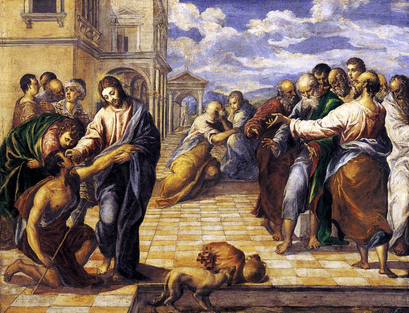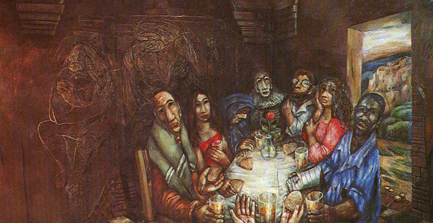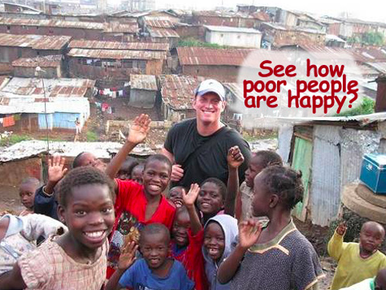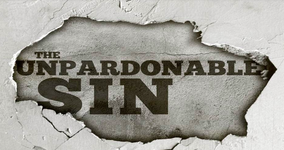 Some people take advantage of crisis for the power they might gain. Some take advantage of crisis to focus on what's important. Some . . . to really listen (or at least well or better than before the crisis). I claim no insight into God's mind and maybe, I'm the only one, but I have been thinking a lot lately as I have been shopping for COVID-19 survival items for my congregation (if anyone needs something) or for my neighbors . . . some early morning pondering . . . So, here's a few things that have been on my mind lately: ☛ This crisis has not caught God by surprise (a cliché, but still true) ☛ Our most vulnerable are truly vulnerable at this time, and that should concern churches ☛ I am way too political (i.e., politically thinking, that is)--and I wish socially minded Christians would stop telling me the gospel is political, which drives us to party politics, not church, not Jesus ☛ Church is easy(er) when we are not facing non-ordinary times; these are non-ordinary times ☛ This non-ordinary time is normal times for much of the global church ☛ Church leaders have not prepared Christians for trying times (well, at least, I have not done as good of a job as I should have–but that doesn't grow churches well these days) . . . and Christians have let the leaders not prepare them for trying times ☛ No matter how temporary this COVID-19 crisis is, it shows us (or should show us anyway) that things for the church can change on a dime (and fast) ☛ Whatever this COVID-19 crisis is, I am convinced this is a test of faithfulness, not only faithful to Jesus, but also a test of faithfulness to church–-not just church in general, but faithfulness to a local church, your particular body of believers ☛ We (i.e., Christians and church leaders) have been counting on the trusted institutions of Christendom to help us maintain the way we do church ☛ We have a poor imagination for doing church, which is a barrier for reaching the lost (i.e., the unchurched). Okay, I've been thinking a lot.
0 Comments
 The unpardonable sin? What is this? Have I committed it? If you have, the ball game is over, done, finished. You can never ever be pardoned. Ever. According to both the Matthew 12 and Mark 3 unpardonable sin texts. And, this pastoral nonsense, that is, "well, if you are concerned about it, then you haven't committed blasphemy of the Spirit" is not in these texts as a way around it. Yet, pastors and lay-people/teachers use this "counsel" all the time. It seems the default pastoral answer. (How do pastors know this, anyway?) But, whatever it is, it is serious stuff. So, I believe the better question is, how should we read this "blasphemy of the Spirit" text in Matthew 12? And, what does it mean to the church that reads (in Matthew's Gospel) this rebuttal and warning from Jesus to the accusing temple leadership? This “sin” from Matthew 12 (cf. Mark 3) have been misappropriated so much that it fits the adage, if you keep telling a lie over and over again eventually everyone just thinks it to be true. Although, preachers and teachers might certainly not be lying, they have, however read back into these texts what has “always” been clear since it seems true and has been repeated over and over (so they repeat). Let us, however, look at the logic (the simple grammar and the context) happening in the Matthew 12 “blasphemy against the Holy Spirit” text. The unpardonable sin referenced here has to be related to the previous verse (the one that heads the paragraph, verse 30), for the warning of such blasphemy against the Spirit begins with a “therefore” (v. 31; Διὰ τοῦτο/dia touto, literally “on account of this,” “because of this”). So, the reader must ask, “therefore what?” or “on account of what?” Well, verse 30 is the answer:“He who is not with Me is against Me; and he who does not gather with Me scatters.” So, the “sin and blasphemy” is related to the one who “is not with” Jesus, but is “against” Him. And still, the “is not” and “against” is very specific—it is not a general “anyone who isn’t a Christian” or “any who reject Jesus” (which neither are in the text—yet, we continue to back this understanding in to the text). No. The one who “blasphemies against the Spirit” is the one who scatters and does not gather (based on verse 30). This is a leadership sin, a leadership blasphemy. At least here in this text. It is a rebellion right at the top. For, the terms “gather” and “scatter” are shepherding terms, which are very appropriate to the context Matthew gives to this narrative. Earlier, Jesus is looking upon the marginalized, oppressed, the poor, the bottom demographics and says, “Seeing the people, He felt compassion for them, because they were distressed and dispirited like sheep without a shepherd” (Matthew 9:36). This is what is clear from the text. Blasphemy against the Holy Spirit is related to the absence of shepherds that care/guard/protect the sheep, that is, sheep who are among the “distressed and dispirited” (FYI, this is the meaning of “poor in spirit,” but that for another time). The no shepherd/scattered-lost sheep portrait is pulled from Ezekiel’s prophecy and warnings (how about that, a warning!), and, specifically, Ezekiel 34:5: “So they were scattered, because there was no shepherd . . . My sheep were scattered.” Also, interestingly, Ezekiel portrays the restoration of God’s people and their return to covenant faithfulness as facilitated by the . . . wait for it . . . the Spirit (Ezekiel 36-39); thus, further linking our “blasphemy against the Holy Spirit” in Matthew to Ezekiel’s prophecies and warnings. Thus, we need a reading of this text with the no shepherd/scattered sheep framing in the narrative. Finally, it is important to note that Matthew has already set this all up in narrative. How do people know that Jesus is the promised Messiah: What do they hear and see? blind receive sight lame walk lepers are cleansed deaf hear dead are raised up poor have the gospel preached to them (Matthew 11:4-6). No doubt this is Matthew’s version of Luke’s draw on Isaiah 61, which promises that God’s Spirit (how about that, the Spirit again) would be on the Messiah to preach the gospel to the poor, to heal, free, and bring justice (Isaiah 61:1). This is the context in Matthew. This is exactly what Jesus is doing: He is fulfilling the Isaiah and Ezekiel vision of future redemption. This is what the temple and synagogue leadership miss, ignore, or are fighting against. So the blasphemy of the Spirit–the unpardonable sin–is more closely related to the role of shepherds in relation to sheep, that is, leaders among God's community and the sheep appointed to their care/protection (i.e., in Israel's case, temple-leadership; in our case, church leaders) that do not consider the poor or design (religious or church) systems that marginalize the poor (e.g., unintended consequences or purposeful matters not). In other words, to not do as Jesus did, that is, in having compassion for the despised, distressed, and bottom demographics is to deny that the promised time of redemption has arrived and, thus, is not forgiven—forever! The "sign" of the kingdom of God's arrival was (and I cannot find in the NT anywhere where this has changed) that the gospel was preached to the poor, the oppressed set free, and disabled walk. This is affirmed in Matthew's Gospel. The whole "blasphemy of the Spirit" episode hinged on Jesus casting out demons and healing a deaf mute so he could hear and speak, a sign of God's kingdom and that Jesus is the Spirit-anointed Messiah. Thus, the narrative meaning of the blasphemy of the Spirit, which is clear and can be inferred by a faithful reading of the text and context, is to stand in rebellion against the inauguration of the kingdom of God and to shame (lower the standing) of Jesus. Rejecting (hindering, acknowledging, ignoring) the kingdom's presence signaled by God's concerned for the poor et al. is, well, blasphemous. *I have not spoken to the issue of "honor/shame," which is most certainly an element framing Jesus' hostile encounter with temple-leadership. The scribes and Pharisees are publicly shaming Jesus, calling Him the son of Satan and empowered by Satan to do "these signs." So, in one public shaming Jesus is put down and His miracles were not the true signs of the kingdom of God. This isn't just about call good evil and bad good; this is about wholesale disbelief and rebellion against the inauguration of God's reign–which is why it's unpardonable.
My Ego, Not My Potential, Was Offended: A personal reflection on the mind of Christ (Philippians 2)2/20/2019 The following is adapted from my book Destroying Our Private Cities, a lay commentary on Paul's Letter to the Philippian church. I used an abbreviated form of this personal illustration during a recent sermon at Christ Presbyterian Church in The Hill, the church I am privileged to pastor in the Hill community of New Haven, Connecticut. The sermon was on Jesus eat with tax collectors and sinners (from Matthew 9); was used in a presentation on submitting to spiritual authority, the section on "Learning to Imitate Jesus." This illustration is the conclusion to my chapter on "Putting Jesus to Our Potential," an exposition on Philippians 2:5-11 A Menial Job Through my seminary years I worked part‑time to help support my family. My job consisted of the two things I despise more than anything on earth: cleaning and vacuuming. I was a janitor. Already I was a wreck emotionally. The combination of being a nobody at school and a janitor for a daycare center made things worse. I felt I was not fulfilling my potential. One day while cleaning a toilet I got angry at God. Slamming the sponge down into the toilet bowl, I said, “I am a preacher, a teacher. And here I am cleaning toilets!” I protested not getting the church position. I complained about not preaching. My insecurities matched my “unfulfilled potential.” I knew I was dealing with pride, but I thought my complaint was justified because I did have gifts, you know! In the midst of my tantrum, God brought to my mind a sermon illustration I had heard back at college. The preacher recalled the story of a rather well‑to‑do graduate student who finished top of his class with a doctorate. He felt called to the ministry, and a rather prestigious Philadelphia congregation invited him to be their pastor. But the young man felt called to work with William Booth in England. So he left America to apply for a ministry with the Salvation Army. At the interview, Mr. Booth told the young man there was no place for him. His education and wealthy-status would hinder him from taking orders from street preachers, some of them former drunks and prostitutes. But the young man was persistent, and Mr. Booth gave him a try. He sent him to a dark, dingy cellar to clean and shine the muddy boots of the street preachers. After a while, it occurred to the young man that indeed he might be wasting his talents and gifts. “You call yourself a servant of God,” the devil seemed to be saying, “but look at you. You’re squandering all you have to offer.” The man thought of the Philadelphia pulpit he had turned down. But as those thoughts danced in his head, another Voice whispered, “It’s all right. I washed their feet too.” My Ego, Not My Potential, Was OffendedThere at my daycare janitorial job, I realized the issue was pride and my false sense of fulfillment. It was my ego that had been offended, not my potential. Here in the United States we have, now, over 300 million “most important persons in the whole world.” Logic would suggest someone’s potential is going to be sacrificed. The mind of Christ turns this idea right‑side‑up. We must consider that the pursuit of our potential might actually be a disadvantage for others and a hindrance to the gospel. It is not self‑fulfillment but self‑submission that God desires. But you say, “If I give myself to sacrificial obedience, I could be put in a position where I was taken advantage of. I could be used and, even worse, abused.” That possibility exists. And it happens far too often. The solution is not to reject the biblical text and shrink from sacrificial service to others. The solution is to exercise the mind of Christ. Each of us has limited time, energy and resources. We should be selective. The Christ‑hymn of Philippians 2 supplies the appropriate elements for the decision‑making process.
 Imagine, a beggar now preaching the gospel and discipling a small group of believers meeting in a doctor’s home. There is plenty of room in the Father’s house. Imagine, a former male temple prostitute now the appointed host of a gathered-church in a small, shanty shelter of a home. There is plenty of room in the Father’s house. Imagine a young women who used to offer herself at that very table to the men who use to recline for their symposia dinners now offering prayers and thanksgiving saying, “Who the Son sets free, oh is free indeed, I’m a child of God, in my Father’s house, there’s a place for me.” Imagine a household slave reclining at a table he would never have been allowed to eat from lifting up a loaf of bread, breaking it and saying, “Jesus instructed is, ‘This is my body, broken for you,’ He has made us one body in Christ.” Imagine, a merchant male head of a household, who has thrown out two deformed born infants and an unwanted girl infant now sitting next to his daughter and son and his slave’s children all at the table, an elder teaching a rag tag of forgotten in his home, saying, “Jesus instructed us, ‘This is the cup of the new covenant, My blood shed for you for the forgiveness of sins.’” In my Father’s house there is a place for me, a child of God, yes I am. In 1 Peter 5, the apostle of Jesus turns his attention to church leaders–no doubt to the male head of households who now occupy the leadership roles and shepherding of the house churches in Pontus, Galatia, Cappadocia, Asia, and Bithynia (1:1). The apostle had been speaking of the church under persecution, suffering, and the object of outsider insults (2:11-4:19). The stress has been on the church’s (i.e., the individual believers) conduct outside of the gathered-church (2:12). Peter addressed slaves who had found themselves a part of a gathered-church, fully welcome to recline at the table, who had to return to unbelieving masters, subject to all the horrors of enslavement in an empire-space where they would not even be considered equal to a beast of burden. He spoke to believing wives, equal at the table of the gathered-church, who had to return to unbelieving husbands and subject to all the social-cultural space of women in the Greco-Roman world (3:1–6). Of course, Peter put the hammer down on husbands to be different than the social and cultural definition and expectations for husbands, now honoring their wives (3:7).
Imagine Greco-Roman male head of households who were the very heart of enforcing the social and cultural imagination of the Caesar-cult and the empire, now charged to act like Christ, to honor their wives, treat their slaves as human-beings, equal in all ways, and to treasure all born to them, the deformed, the girls, the boys. Imagine that these men, once the center of the Roman universe were so deconstructed by the good news of the forgiveness of sins and then reconstructed (by and through faith) to die for their family, to suffer for Christ, to make disciples–that is the good news for the community, the challenge to the empire, the stand against Caesar. The household gathered-church, God's way of changing the world. Imagine.
Two reflective thoughts on Christian leadership (based on studying 2 Chronicles for a sermon series)7/28/2017 Over the past few months I have been studying through 2 Chronicles for a current sermon series on this part of Israel's history and how it applies to our CPC in The Hill congregation. Here are two thoughts--my former Prairie Bible College students would have called them "Chip's stream of consciousness."  Reflecting on the events and personalities in 2 Chronicles 10-12 has lead me to consider the problem of leadership--once again. I contend the spiritually mature is reluctant to take up the mantle of leadership, for she or he knows that stepping into such a role will challenge his or her own humanity and will face the massive temptation to deny, redefine, or hinder the humanity of others. The truly spiritually mature is hesitant in taking a leadership status for there will be great temptation to enjoy, and then to crave, the idolatrous power that so naturally attaches to and is granted to leaders. The platform for Christian leadership is fraught with danger, idolatrous infirmities, and is a dark place, full of terrors (as a Game of Throne's character would say about the night).  Seems many believe that the goal of the strong (well at least those who consider themselves strong) is to help critique and then change the weak into the strong; whereas, the way of God in this world (as far as I can see in the Scriptures) completely turns our cultural attitude about strength (i.e., the strong) and the contempt for weakness (i.e., the weak) on its head, that is, the strong (who are only so by God’s grace and nothing in and of themselves) are to carrier, advocate for, and serve the weaker. Those privileged with some measure and gift (for all things are given, there is nothing that hasn't been received as gift, cf. 1 Corinthians 4:7) of strength (be it wealth, health, physical strength, clarity of mind, talent, or even the immediate amenities needed or desired for life), you have the gift in order to expend it on others, especially those who are weak (be it the lack of wealth, health, physical strength, clarity of mind, talent, or even the immediate amenities needed for life). This is the way and mind of the One we are called to follow, the One who had it all and left it all to become a servant, even a servant to the point of death on a cross (e.g., Philippians 2:5-11). *A side note, since I am also studying 1 Corinthians as well: It is interesting to note this also seems to be the issue at the table in 1 Corinthians 10-14.
While attending an early morning men’s prayer and devotional time (as a guest of the one leading the study component), I was horrified by some of the strained thoughts on the passage. The study leader actually tried to stick to the James text; it was the poor rich readers that made comments to lessen the impact of what God was saying through James' words in chapter 5 of his letter. Here are some of my thoughts as the poor rich readers of the Bible commented on James’ words:
Some might not think it, but I was being charitable here. My thoughts were a bit more harsh and even more direct than what I penned above. I will grant that it took me eighteen years after becoming a Christian to begin to see how suburban, affluent, and political I had been reading the Bible--all the while thinking I was interpreting rightly. We need to stop taking the poor out of the texts that actually call us to judgment for not doing something for the poor--neutrality, distance, time, politics will not be allowed as excuses on that day God judges all of our hearts. For on "that day" our riches will have rotten and our garments will have become moth-eaten. Our gold and our silver will have rusted; and their rust, on that day, will be a witness against us and will consume our flesh like fire.
to the confrontation and the seeming ultimate curse of total unforgiveness is all about Jesus vs. Jerusalem temple leadership.  It is interesting that contemporary church leadership typically uses the threat of blasphemy of the Holy Spirit against lay-people who do not surrender to how that leadership understands their own authority and how they perceive God’s will over those very lay-people’s lives. However, church leaders cannot escape the narrative fact that the Mark 3 Beelzebul episode itself, the preceding conflict thread (2:1–3:6), and, as well, the Sower parable (4:1–12) seem specifically directed at them. Jesus uses the convention of shame in the Beelzebul story, pointing to a needed correction within church leadership. For church leaders a posture of shame is needed, which once adopted reminds them of the illusive nature of status, the dangerous allure of power, and the recurring failure of faulty structures to guard the gospel and the church from the destructive influences and seductive cultural patterns that oppose God’s reign over all spheres of humankind. It should not surprise us that the shaming inherent within the Beelzebul episode, intertexted through Mark’s Old Testament links, connects church leaders to the church’s responsibility (and neglect) for the economically vulnerable. Caring, protecting, and advocating for the poor gives away power and public association with those living with the effects of poverty risks lowering one’s church community status. However, maintaining power and its enabling structures so that one’s social standing and status remain in place (even among, and more particularly, the Christian community) at the expense of the weakest and most vulnerable among us is synonymous with blasphemy against the Holy Spirit—breaking covenant, risking outside status and, thus, the condition of being eternally never forgiven. The biography of Jesus vs. Jewish leaders in Mark 1-3 is linked to the biography of the disciples, who like the ones beside Jesus (i.e., his associates and extended family, 3:21; cf. 6:1-6) and like Jesus’ earthly family (3:31–32), are at risk of being outside (6:51–53; 8:16–21; 8:34–38; cf. 9:33–34; 11:31; 16:14), if they, too, are not doers of God’s will (3:33–35). This is particularly relevant to church leaders, as they stand before the Mark 3 text (i.e., the Outsider-Insider sandwich), for the Beelzebul episode ought to shame them in those areas that are too closely identified with that which opposes God’s rule and kingdom (cf. Mark 1:15; 3:25). Mark’s Beelzebul episode functions similar to OT penitential prayers, allowing the reader/listener to enter a life narrative that reflects an appropriate shame for allowing those destructive forces and influences to distract from obedience to God’s word and work in the world. And like OT penitential prayers, a disposition of shame humbles the reader/listener before their “disobedience to the Mosaic ideals” that often reflects “mistreatment of the poor and the weak,” and gives them a way home that maps a spiritual disposition for restoring a fractured obedience to God. Interestingly after confessing that Jesus is the Messiah, Peter is soon rebuked as a surrogate of Satan’s interests: “Get behind Me, Satan; for you are not setting your mind on God’s interests, but man’s” (Mark 8:33). Significant to the reader/listener is the immediate juxtaposition of the Peter-Satan rebuke and Jesus’ admonishment that true followers must deny themselves (the opposite of power, an emptying of power) and take up their cross (v. 34). Church leaders who intentionally incorporate social action in a church’s evangelistic activities fulfill the obedience implications of the Beelzebul episode and, thus, raise Jesus’ honor rating in the public sphere. Without such a public disposition, church leaders are further warned that “whoever is ashamed of me and of my words in this adulterous and sinful generation, of him will the Son of Man also be ashamed when he comes in the glory of his Father with the holy angels” (Mark 8:38).
|
AuthorChip M. Anderson, advocate for biblical social action; pastor of an urban church plant in the Hill neighborhood of New Haven, CT; husband, father, author, former Greek & NT professor; and, 19 years involved with social action. Archives
February 2024
Categories
All
|
Pages |
More Pages |
|


 RSS Feed
RSS Feed